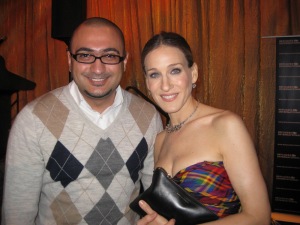Jon Stewart puts things in perspective and sends his colleague Jason Jones to Iran!
Headscarf
Muslim Americans Serving in the U.S. Government
From the White House YouTube page:
Seeing Our Past in ‘Betrayed’
 It was the same scene playing in my mind as it was on the stage. A young man called Adnan standing between mutilated dead bodies at the Baghdad morgue, looking for his friend’s body. As I was watching, I recalled how I stood in the real morgue back in 2006. The smell of the decaying bodies and the horror of being identified by the militias who were controlling the morgue flashed back into my eyes. I couldn’t but feel the warm tears pouring, watering my cheeks. The whole scene reminded me of the story I covered for the Washington Post when Shiite militiamen killed hundreds of innocents after the Samarra shrine bombing in 2006, an incident that triggered the civil war between the Sunnis and Shiites in the war-torn country.
It was the same scene playing in my mind as it was on the stage. A young man called Adnan standing between mutilated dead bodies at the Baghdad morgue, looking for his friend’s body. As I was watching, I recalled how I stood in the real morgue back in 2006. The smell of the decaying bodies and the horror of being identified by the militias who were controlling the morgue flashed back into my eyes. I couldn’t but feel the warm tears pouring, watering my cheeks. The whole scene reminded me of the story I covered for the Washington Post when Shiite militiamen killed hundreds of innocents after the Samarra shrine bombing in 2006, an incident that triggered the civil war between the Sunnis and Shiites in the war-torn country. The play was great. The New York Times put it in the best words:
“But the clarity of the writing, the urgency of the story being told and the fine performances give the play a sharp dramatic impact and a plain-spoken beauty. Painful human experience is presented here as just that. Nothing else is necessary to awaken sympathy, despair and awareness of a grave moral failure on the part of the American government.”
 Last night was great not only because I watched the play, but also because I had the chance to meet George Paker whom I consider my idol, along with Anthony Shadid. I never want anything in my career life just to achieve at least half of what they achieved. Mr. Paker was a very nice person. We talked about the article, the play and of course his book The Assassins Gate.
Last night was great not only because I watched the play, but also because I had the chance to meet George Paker whom I consider my idol, along with Anthony Shadid. I never want anything in my career life just to achieve at least half of what they achieved. Mr. Paker was a very nice person. We talked about the article, the play and of course his book The Assassins Gate.
Before the play started, my Iraqi friends and I had the chance to speak with celebrity and American actress Sarah Jesscia Parker who was hosting the play along with Matt Dillon, and Refugees International. We had the chance to speak with Sarah Jessica about how we lived and worked for American organizations, be it for the government or for the U.S. newspapers. My friend, B, whom the play was partly based on her story as a young woman working in the Green Zone for the Americans, explained to the superstar the reality of the daily risk she put herself in to do her job. Parker was all ears. It was the second time she attended the play. She said she was ready this time. She brought her tissues.
Saudi Woman’s Rebellion
 My Saudi friend Ali has forwarded me a very interesting essay that I thought of sharing with you. As we all know, feminism in Saudi Arabia is locked behind the iron prison bars of the extremist Wahabi clerics and the male-dominant culture that crippled the other half of humanity component.
My Saudi friend Ali has forwarded me a very interesting essay that I thought of sharing with you. As we all know, feminism in Saudi Arabia is locked behind the iron prison bars of the extremist Wahabi clerics and the male-dominant culture that crippled the other half of humanity component.
I am No Longer Ashamed!
By Nadine al-Bdair
The story started when I was destined to mourning, when they drew the black and forced me to wear it, making the city look even darker.
In her childhood, the young girl did not care about her body because it was a source of smiles. But if she is gets taller, her feminineness becomes a source of a scandal, and all what she has becomes bad and disgrace. She becomes ashamed of her body. Therefore, she helped them wrap it. She covered her mouth, blinded her eyes, hid her fingers in the darkness, and widened the cloth on her chest, waist and legs. Only through the cloth she got hot and suffocated air, that felt exactly like her.
—
I became eleven years-old. My voice was a shame.
Women in my family said, “Women’s voice is one of the reasons of her honor. Whenever it gets louder, she is less respected. She has to whisper.”
That means my voice is a sin.
They also said that my looks are sins, and so does my laughter.
They said that the honor of the society lies between the thighs of its women. The men’s honor would be gone with one smile from me. ALL the men’s honor would be gone with the first eye contact I do with a man I like. They said women’s virginity is a source of proverbs.
These were women who told me to be bashful from the requirements of nature. These were women who taught me how to stick my eyes to the floor.
At age fifteen, the Religion [female] teachers who are obsessed with religion stressed that the girls who do not cover their heads in life will be hanged by it in the afterlife.
So my hair became a sin.
Once, a teacher swore that the face of the women was created to have it exclusively enjoyed by the husband. Every woman’s job would be done by surrendering her body to a [husband].
I wish I asked her, “what if I weren’t married?” What should I do with my face, the enjoyment tool that I possess?
I grew up and the mosque imam’s voice made its way to my ears every Friday, distracting me from my studies with his entertaining tales, swearing hundreds of times that a woman’s body is a curse that should be removed from life.
Now all of me is a sin. So why were I created? Is that why they chose the black [dress] for me? To mourn coming to this world as a woman?
How were I convinced to be ashamed and bashful instead of being proud of this universal miracle?
The most important question is when did the woman start being ashamed of her presence?
For me all I know is that they included the woman’s period in religion classes, which I memorized. It mentioned that I have to live several days of every month “dirty.”
I searched the word’s meaning in different Arabic dictionaries where I found all synonyms for this word mean “filthy.” I then became ashamed. How could I not when I was the filthy? I am not clean and pure creature.
Then I wandered in the world and saw…
I saw the statues of the ancient gods naked. I saw women’s bodies sculptured in the streets and roads and on the walls of the caves and inside the castles and mansions in a scared way. Everybody mastered art in sculpturing my body which carries that miracle of creation, the symbol of birth, the body that the ancient statue worshipers could not hide their admiration of. They worshipped it and considered it sacred.
I imagined the fate of these statues if they were created in our region. I imagined them destroyed and covered with cloth. I even imagined them as a source of respecting society that respects women’s bodies instead of hiding them.
How the ancient glorified my body and how my people destroyed it!
I won’t take part in this sin. I won’t mourn.
I returned back to my society where men boast their open chests while women boast of how large their dresses cloths are. Even though the logic says that I should cover my body, men should do the same to be ashamed of their bodies, because women’s bodies are more beautiful. Beauty is the thing that should be all over the streets, not the opposite.
I returned back and saw the cloths are the main scale to distinguish between people and be against all human rights. Some meters of cotton are enough to judge on the women wearing it whether she is good or bad. That woman is good because she wrapped herself well. That one is on her way to be good. She still needs to cover her eyes and follow the path of purity. And regarding that one, God keeps away from her, walks and big parts of her chest are shown.
Cotton and silk… These are the scales of manners for us, as long as everything is happening inside and not shown to public.
The first society slap I ever got was when I was in high school whose teachers were extremely religious. I was always shy to go to school because it was decided to put on the Abayas that all students would go to paradise and only me and my other friend would go to hell where we are going to be grilled and our meat would be eaten by beasts.
I envied them because I was not one of them.
One day, one of my classmates asked me to call her boyfriend and tell him about the next meeting’s place because her phone was not working.
“How come you do such a thing and you are the pure and bashful girl who does not even show her hands and feet?” I asked.
“What does that have to do with what I am doing? You are an infidel if you don’t wear a scarf and leave your body open to strangers to see,” she replied.
These are the scales of manners here: as long as things happen secretly. As long as the body is all covered, [you can do whatever you want].
—
The same body remains whether inside or outside the fences [of clothes]. What I care about today is the outside, when the man speaks loudly and sings while shaving, by the time we whisper when we pick our brows . We whisper when our bloodshed comes. We hide the best proof of life and its continuation on earth.
Because whispering is a proof of a sin and because I am not a sin, because I am a miracle, I will speak loudly to make humans hear me. I will laugh and unveil my presence to enjoy myself, not a man.
An American journalist once asked me in an interview, “Why do you wear high heels? You don’t need that.”
I told him, “The most thing I like about high heels is that when I walk in a hallway and make my steps movement be heard. People at the end of hallway would stop chatting to know who that high-heel-woman coming. This is the means I use in the environment of a culture that is ashamed of my presence. The culture that considered women’s high heels a disgraceful thing. This is my means to tell them that my body is moving and this movement is making this sound.
blog.bassamsebti@gmail.com